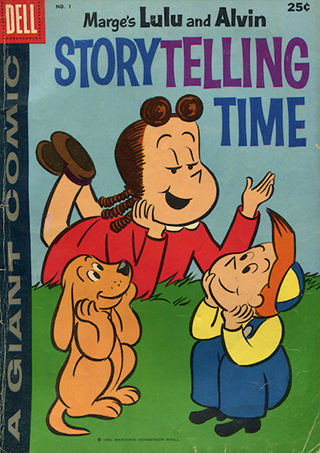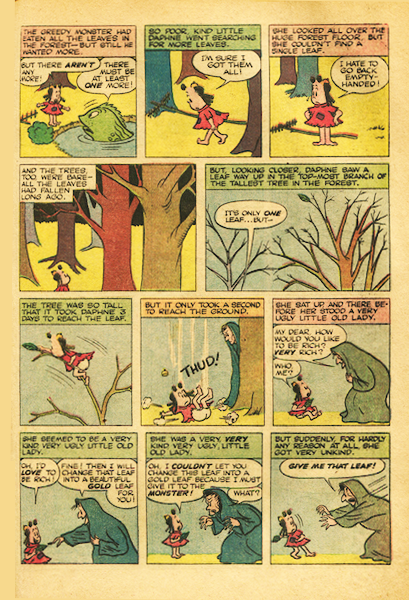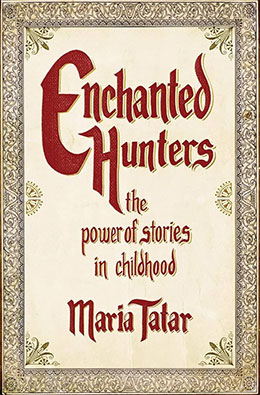
Many children were once introduced to fairy tales by Andrew Lang’s books or the complete stories of Grimm or Anderson. Modern children are (over)exposed to the Disney versions. I didn’t have either. My fairy tale reading consisted of a few stories in an old encyclopedia and I was sixteen when I saw Disney’s Sleeping Beauty, my first Disney fairy tale in a move theater.
Yet I was steeped in fairy tales through Little Lulu comic books. How I loved Little Lulu! Each month I scoured Drug Fair for the latest issue (only ten cents!). During the year, extra-thick special issues for Halloween and other holidays appeared. I enjoyed the contemporary stories about Lulu, who always bested Tubby and his gang. Mainly, I pored over the feature where Lulu told a story to her next-door neighbor, Alvin. Marge’s Lulu and Alvin Storytelling Time was my favorite special issue comic.

These stories starred Lulu herself, often as a poor, ragged girl, who wore patches on her red dress, picked beebleberries, and lived in the woods. Poor, ragged Lulu was often hungry, barefoot, and ignored by normal people. She usually had to deal with villain Witch Hazel. Each month, and in the Storytelling special, I absorbed fairy tale elements in Lulu’s stories: Lulu’s woods were enchanted, Lulu had to overcome obstacles, Lulu sometimes dreamed of a happier life (like being warm or having enough to eat), and she wanted a true friend. Mostly, Lulu was content with her lot and glad to return from her adventure to her cottage or shack, the element of home-away-home. In those stories, Lulu was an everyman (girl!) hero, tossed into extraordinary circumstances that forced her to draw on her own strengths.
Poor Lulu had few possessions: a toothbrush with one bristle, a tin can for a jack o’lantern. In one story she had a scrub board that she loved “better than a dolly.” I had my stuffed elephant; Lulu had a humble scrub board. Psychoanalyst W. D. Winnicott called the prized items children cling to transitional objects, things that help them travel from waking to sleeping.
Other stories told to Alvin featured Lulu as a princess “who lived all by herself in a great, big, gloomy castle. She had no family, no playmates, no pets, and no toys at all to play with … the moat surrounding the castle was a monster. People wanted that gold. Three tried various, disastrous methods (rule of three!). A poor boy who only wanted to visit the princess was allowed across.
In yet another story Lulu was “a very happy little mermaid because she had her own little rock to sit on and comb her long beautiful hair.” Mermaid Lulu is captured and put on display, saved by a boy who felt sorry for her and returned her to the sea. In most of the stories, though, Lulu saved herself and often others, too.
 Through Little Lulu, I was reading fairy tales, in some cases, based on Anderson or Grimm. By soaking up stories of monsters and witches and evil humans set against scenes of truth and goodness, I became one of Maria Tatar’s enchanted hunters. As Tatar says in her book Enchanted Hunters: The Power of Stories in Childhood:
Through Little Lulu, I was reading fairy tales, in some cases, based on Anderson or Grimm. By soaking up stories of monsters and witches and evil humans set against scenes of truth and goodness, I became one of Maria Tatar’s enchanted hunters. As Tatar says in her book Enchanted Hunters: The Power of Stories in Childhood:
Radiant beauty, combined with jolts of horror, can produce a form of ignition power that turns readers into roamers — wanderers in intellectual precincts with destinations in mind. They become enchanted hunters, fully appropriating a role that will empower them … As we read, we engage, interpret, and improvise, creating new narratives with the same catalytic power and transformative energy of words on a page.
When Lulu tells stories to Alvin, who is younger and rambunctious, she calms him down as well as entertains him. Her stories also have a hidden moral.
In elementary school, I devoured library books and scribbled stories. Books — and Little Lulu comic books — empowered me into a different role, that of a storyteller. When my rambunctious boy cousins came to visit, I often led them downstairs into our basement, a dim, musty, unfinished space. We sat on the dusty floor behind the furnace. With my face lit by the blue flame of the pilot light inside, I told them improvised stories about ghosts and witches and monsters. My audience was ignited.
Today, as an author of children’s books and a student of children’s literature, I study fairy tales to understand their importance and how they work, a journey I began more than sixty years ago, thanks to a certain little girl in a red dress.
